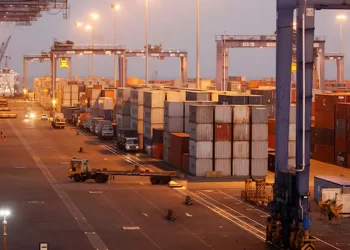LAHORE: The Lahore Chamber of Commerce and Industry has urged the government to address the concerns of business community as the Finance Act 2024 and some recently issued SROs by FBR contain several amendments would disproportionately affect the businesses compliant with tax regulations.
In a letter to Prime Minister Shahbaz Sharif, President of the Lahore Chamber of Commerce and Industry Kashif Anwar emphasized the critical need for the government to revisit these measures in collaboration with stakeholders to ensure they do not unfairly burden compliant taxpayers. He underscored the importance of fostering an environment that encourages documentation among retailers and sectors currently outside the tax net.
The LCCI President said that SRO 350(I)/2024, dated 7th March 2024, has linked the buyers’ ability to file sales tax return to the compliance of their suppliers. If any of the supplier does not file their return, the subsequent buyer is unable to file their sales tax return or has to leave the respective input tax already paid by him to file return, thereby penalizing the compliant taxpayer.
He said that due to this measure, a dangerous chain reaction has been set in motion and many people are being affected and had brought the system to a grinding halt, severely affecting businesses at every stage of the supply chain. Considering the fact that the IRIS system is highly automated, the system cannot take any input and output of sales tax despite the Annexure A and Annexure C in Sales Tax Returns. To resolve the issue of fake invoices, checks should be incorporated in the FBR’s internal system rather than causing inconvenience to all the compliant taxpayers.
Kashif Anwar said that according to the Finance Act 2024, the limit for cash payments of Rs 50,000 under Section 73 is to be considered in aggregate. Considering the recent inflation, the previous limit of Rs 50,000 per transaction should have been enhanced in the Finance Act 2024. This new measure of limiting the cash payments to Rs 50,000 in aggregate would adversely impact the business operations and cash flows of SMEs and manufacturers who are engaged in supplies to the local retailers and other segments of the society. Currently, the economy is not digitized, and instead of providing relaxation and facilitation to local industrialists in these difficult times, such policies are restricting their activities. This provision should be withdrawn for local SMEs, providing them with the breathing space needed to run their businesses smoothly and cope with the current economic challenges.
He said that according to the Finance Act 2024, the Advance Income Tax to be collected from retailers under section 236H has been increased from 0.5 percent to 2.5 percent. Retailers have been indirectly bound to register for sales tax if their purchases cross the limit of Rs 4 million. The manufactures are already paying 4 percent additional sales tax of retailers and this 2.5 percent advance income tax is an additional burden for the manufacturers.
The LCCI President added the policies must be aimed at bringing more segments into the income tax net rather than turning them away from the Tax Net. These strict measures will not bring the undocumented sector into the tax net; rather, they will incline these sectors to stay away from the tax net and create further problems for SMEs in issuing sales tax invoices.
He was of the view that the government must encourage the retailers and those segments who are not in the documented sector to increase their documentation and enhance their turnovers. Keeping in view the ground realities, the undocumented sectors must be facilitated to the maximum extent so that businesses which are not registered with FBR are being encouraged to come into the tax net.
“The Lahore Chamber of Commerce and Industry expressed confidence in Prime Minister Sharif’s visionary leadership to steer Pakistan towards economic revitalization and called for proactive steps to support businesses in these challenging times”, Kashif Anwar added that hoped that the government would immediately review the measures in consultation with the stakeholders.
LAHORE: The Lahore Chamber of Commerce and Industry has urged the government to address the concerns of business community as the Finance Act 2024 and some recently issued SROs by FBR contain several amendments would disproportionately affect the businesses compliant with tax regulations.
In a letter to Prime Minister Shahbaz Sharif, President of the Lahore Chamber of Commerce and Industry Kashif Anwar emphasized the critical need for the government to revisit these measures in collaboration with stakeholders to ensure they do not unfairly burden compliant taxpayers. He underscored the importance of fostering an environment that encourages documentation among retailers and sectors currently outside the tax net.
The LCCI President said that SRO 350(I)/2024, dated 7th March 2024, has linked the buyers’ ability to file sales tax return to the compliance of their suppliers. If any of the supplier does not file their return, the subsequent buyer is unable to file their sales tax return or has to leave the respective input tax already paid by him to file return, thereby penalizing the compliant taxpayer.
He said that due to this measure, a dangerous chain reaction has been set in motion and many people are being affected and had brought the system to a grinding halt, severely affecting businesses at every stage of the supply chain. Considering the fact that the IRIS system is highly automated, the system cannot take any input and output of sales tax despite the Annexure A and Annexure C in Sales Tax Returns. To resolve the issue of fake invoices, checks should be incorporated in the FBR’s internal system rather than causing inconvenience to all the compliant taxpayers.
Kashif Anwar said that according to the Finance Act 2024, the limit for cash payments of Rs 50,000 under Section 73 is to be considered in aggregate. Considering the recent inflation, the previous limit of Rs 50,000 per transaction should have been enhanced in the Finance Act 2024. This new measure of limiting the cash payments to Rs 50,000 in aggregate would adversely impact the business operations and cash flows of SMEs and manufacturers who are engaged in supplies to the local retailers and other segments of the society. Currently, the economy is not digitized, and instead of providing relaxation and facilitation to local industrialists in these difficult times, such policies are restricting their activities. This provision should be withdrawn for local SMEs, providing them with the breathing space needed to run their businesses smoothly and cope with the current economic challenges.
He said that according to the Finance Act 2024, the Advance Income Tax to be collected from retailers under section 236H has been increased from 0.5 percent to 2.5 percent. Retailers have been indirectly bound to register for sales tax if their purchases cross the limit of Rs 4 million. The manufactures are already paying 4 percent additional sales tax of retailers and this 2.5 percent advance income tax is an additional burden for the manufacturers.
The LCCI President added the policies must be aimed at bringing more segments into the income tax net rather than turning them away from the Tax Net. These strict measures will not bring the undocumented sector into the tax net; rather, they will incline these sectors to stay away from the tax net and create further problems for SMEs in issuing sales tax invoices.
He was of the view that the government must encourage the retailers and those segments who are not in the documented sector to increase their documentation and enhance their turnovers. Keeping in view the ground realities, the undocumented sectors must be facilitated to the maximum extent so that businesses which are not registered with FBR are being encouraged to come into the tax net.
“The Lahore Chamber of Commerce and Industry expressed confidence in Prime Minister Sharif’s visionary leadership to steer Pakistan towards economic revitalization and called for proactive steps to support businesses in these challenging times”, Kashif Anwar added that hoped that the government would immediately review the measures in consultation with the stakeholders.









